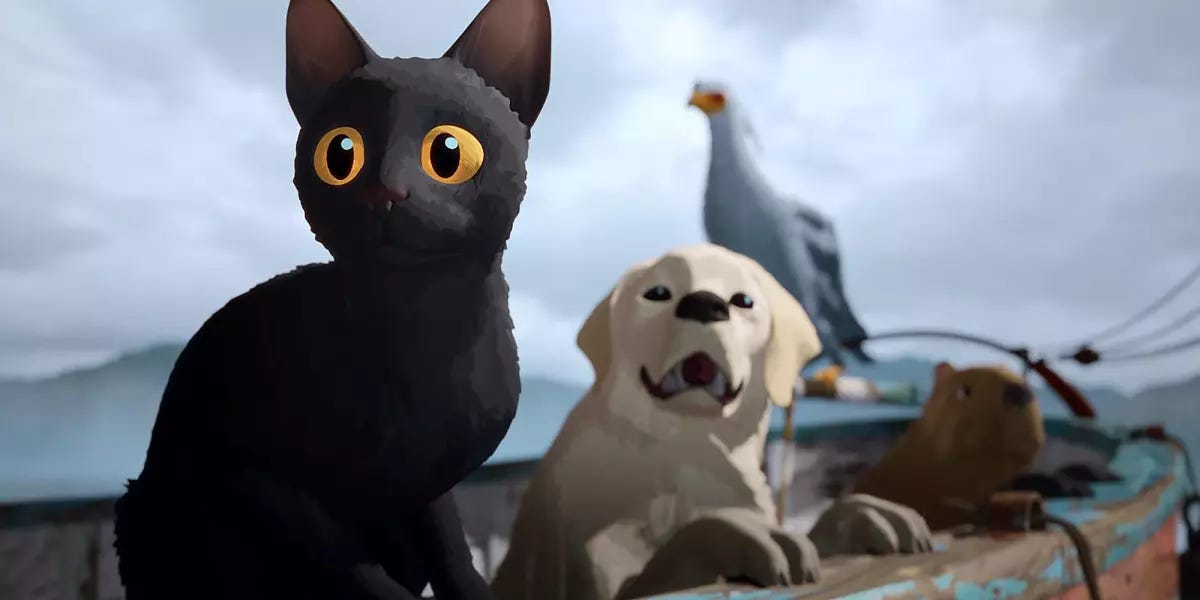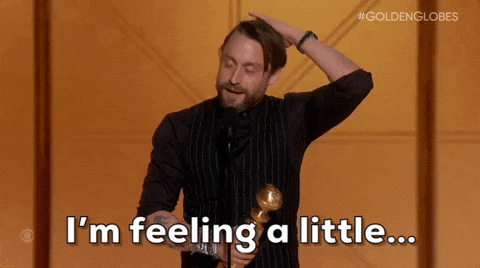If there’s any legacy of this year’s awards season, it may be that everyone’s potential Oscar nominee will need to have their tweets vetted. If you want the complete opposite of the Karla Sofía Gascon experience, look no further than breakout campaign sensation Gints Zilbalodis. The director of Flow (available to stream on Max), nominated for both Best Animated and International Feature, even earned a write-up in Vogue for his posts earnestly breaking down his production process and honestly chronicling his awards journey. In response, he posted the following:
It’s incredibly badass that the 30-year-old Latvian filmmaker who was so modest and unassuming on the day we had our interview (which you can read at Slant or watch on YouTube) now seems to be on the precipice of winning an Oscar over major studio fare. The highest-grossing animated film of all-time could lose to a movie directed by a guy who, before this film, had never worked with another person making his animated projects. It’s a real-life David and Goliath in the best possible way, and I’m rooting hard for him on Sunday.
If you haven’t caught up with Flow yet, this is your push to do just that. This animated film completely won me over both times I watched it in the fall, and it makes you feel all sorts of things without a single line of dialogue. The animal characters clearly communicate to each other and us, but we’re left to piece together what’s being said. I love the way Flow levels the playing field, making viewers from one to ninety-two equally as participatory in creating their meaning of the movie.
But Zilbalodis is hardly the first director to realize that spoken dialogue is not necessary to say a lot within a film. Since the dawn of talkies, plenty of works have radically cut against the noise by opting not to feature traditional verbal exchanges. But by removing one method of communication, they awaken our senses in a different — and often deeper — way. In the style of Flow, here are 10 other films that find wonder by welcoming wordlessness.
All Is Lost, Pluto TV (free with ads)
Only someone whose face and figure carry as much weight as Robert Redford could plausibly get away with playing a character simply credited as “Our Man.” That ability to be just like us and the best of us simultaneously is the essence of movie stardom, and J.C. Chandor uses that to thrilling effect in All Is Lost. The 2013 film is little more than a man vs. nature conflict at its most elemental and immersive as Redford’s solitary seaman battles everything that the weather can throw at him. And Redford, then a septuagenarian, does it all without saying a word (save an exasperated F-bomb deployed at the peak of his misery).
Aquarela, available to rent from various digital platforms
Allegedly, there are 12 lines of dialogue in Aquarela, but you won’t remember them. (I only did when I Googled to double-check if my memory was correct that this was silent.) Victor Kossakovsky’s survey of water all across Earth, be it as fixed as a glacier or as turbulent as a waterfall, is a transfixing object to behold. While this might sound like watching a desktop screensaver, I can promise that it’s gorgeously shot and thoughtfully put together to illustrate humanity’s relationship to a force that may one day subsume us all.
Happer’s Comet, MUBI
If I’d seen Tyler Taormina’s mood piece Happer’s Comet before making my 2023 list “Notes Toward a COVID Cinema,” this would have handily merited inclusion. This compilation of tableaus features people shot alone in what feels like both a liminal space and time. It comes to resemble something like a mosaic of our pandemic malaise, with all our yearning to connect filling the negative space that dominates the frame. The slender 62-minute film opens with a title card explaining that the work is the product of Taormina’s whole family, which only makes the tender humanity all the more palpable in each intriguing image.
Hundreds of Beavers, Amazon Prime Video
2024’s most improbable indie hit was the DIY Hundreds of Beavers, an irreverent adventure caper that pits one man against a coterie of long-toothed mammal foes. The film toggles between the comic stylings of silent cinema, cartoon animation, and Adult Swim … and somehow, it all manages to hold together. I was a bit under the weather for a December revival screening of Mike Cheslik’s dynamite debut feature, but I feel confident I’ll get another chance soon given the film’s near-instant canonization as a midnight cult classic.
Koyaanisqatsi, Pluto TV (free with ads)
You’re familiar with Godfrey Reggio’s avant-garde documentary whether you know it or not. Be it through the Philip Glass score borrowed for Zack Snyder’s Watchmen or the syntax it gave to the last 40 years of commercial advertising, Koyaanisqatsi has more than proven its laurels as a seminal work of cinema. Reggio poses a provocation through the translation of the film’s title — “life out of balance,” a term used by the Indigenous Hopi people — and asks the audience to analyze all the imagery that follows through that prism. His autodidactic work requires the creation of meaning through the collision of sound and image with a viewer’s own experience. Many lesser directors have tried to emulate what Reggio flawlessly achieves here, and there’s simply no topping a true original.
Le Quattro Volte, Kanopy (available through many local libraries)
If you’re curious about the circle of life in a way that goes beyond what you might hear in a Disney song, check out Michaelangelo Frammartino’s Le Quattro Volte. (It’s a little hard to access outside of Kanopy, which many people — not New Yorkers — have access to through their library card.) From human to goat to tree to charcoal, this gently observant documentary gives us a view of life that feels eerily and uncannily removed from it. While adjusting to its rhythms can be challenging, give it a go if you want to experience something outside the traditional linear norms. (I found the goat section especially beautiful.)
No One Will Save You, Hulu
If A Quiet Place fully committed to the bit, you’d get No One Will Save You. Kaitlyn Dever owns the silence as a solitary seamstress who fends off an unexpected alien invasion alone. With no dialogue comes no exposition about her isolated situation, just the primal terror of the moment as she fights for her life. Brian Duffield uses the surreality of his scenario and then pushes it into fascinatingly abstract territory. The aliens here aren’t just some kind of weird metaphor for trauma, and it’s a movie refreshingly unburdened by explaining every mystery or tying up every loose end.
PlayTime, Criterion Channel
Not unlike my boy Charlie Chaplin defiantly making (mostly) silent movies during the nascent era of the talkies, Jacques Tati understands how to position dialogue in a way that makes words seem absurd. Like Chaplin’s Modern Times, Tati’s PlayTime uses the nonsense of garbled talking to represent everything unnatural about the absurd capitalist grind in which we’re forced to live by our overlords of commerce. If it needs explaining to Monsieur Hulot, it merits satirizing. As I wrote when recommending it last year in a post about offbeat global comedies, PlayTime is a “send-up of post-war consumerism is a true merry-go-round of movement that makes a mockery of modernism. Each precisely calculated sequence is more jaw-dropping than the one that came before. You can’t two-screen this one, folks.”
Robot Dreams, Hulu
Have the tissues nearby because Robot Dreams may make you cry with the beauty of its central friendship between a dog and a robot in ‘80s New York. The only words you’ll hear in this darling animated story are those of Earth, Wind & Fire’s “September.” Berger’s touching tale is a reminder that friendship carries a language all of its own, one that’s often indecipherable to onlookers. We get just enough information to know exactly what this duo says — and doesn’t — throughout a relationship that sees many natural twists and turns.
The Tribe, Peacock and Tubi
This is, I kid you not, maybe the bleakest and darkest movie I’ve ever seen. But if you’re willing to venture into The Tribe knowing that, you’ll almost certainly appreciate the verve of Myroslav Slaboshpytskyi’s filmmaking. The movie takes place as the innocent Sergei enters a school for the deaf only to find a dangerous criminal element operating within the walls. The gambit: there are no subtitles to translate their sign-language conversations. While we can’t hear the characters in the film, we can still understand them — the miracle of cinema.
Don’t forget: you can always visit this newsletter’s online home at marshallandthemovies.substack.com to access the full back catalog of posts! One that might be of interest in February is 2022’s Black History Month. If you’re looking to celebrate stories beyond pain and trauma, here are 10 of them.
As promised, here are all the pieces I wrote out of the Berlin International Film Festival:
Paid subscribers also got to see me embarrass myself by trying my hand at vlogging from my hotel room.
You can keep track of all the freelance writing I’ve done this year through this list on Letterboxd.
You can always keep up with my film-watching in real-time on the app Letterboxd. I’ve also compiled every movie I’ve ever recommended through this newsletter via a list on the platform as well.
After a banger Italian tune in Reflection in a Dead Diamond proved a real earworm, I’ve started building out the following playlist — suggestions welcome:
Ahead of the Academy Awards, it was time to clear out the bookmarked posts about 2024 releases before I never want to hear about another movie released last year again! Here are some highlights:
Profiles of Harris Dickinson, Andrew Garfield, and Adrien Brody
A breakdown of Anora’s ambiguous ending, from Slate’s Sam Adams and in conversation with filmmaker Sean Baker at IndieWire
My Oscar predictions are coming on Friday! Keep your eyes peeled if you’re still waiting to complete your ballot for a pool.
Yours in service and cinema,
Marshall

















Awesome piece! Loved Flow so much.